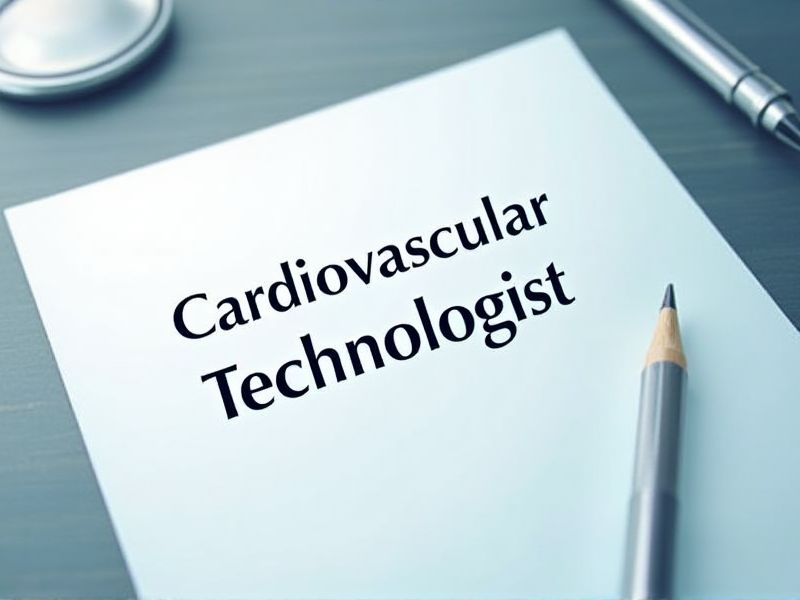
Cardiovascular Technologists play a crucial role in diagnosing and treating heart and vascular conditions, which necessitates a deep understanding of complex medical procedures and equipment. Certifications ensure that they possess the required knowledge and skills, enhancing their credibility and competence. With the evolving landscape of medical technology, such credentials help both in advancing professional growth and maintaining high standards of patient care. Here are some key certifications you may need as a Cardiovascular Technologist.
Registered Diagnostic Cardiac Sonographer (RDCS)
A Registered Diagnostic Cardiac Sonographer (RDCS) specializes in using ultrasound imaging to provide critical assessments, aiding in accurate diagnosis of heart conditions. Their expertise ensures high-quality imaging, which is vital for cardiologists to make informed decisions about treatment plans. The specific certification of RDCS proves advanced training and competence, reducing the risk of diagnostic errors. Healthcare facilities increasingly seek RDCS professionals to meet industry standards and improve patient outcomes.
Registered Diagnostic Medical Sonographer (RDMS)
An RDMS credential signifies a high level of proficiency in imaging technology, which is crucial for accurately diagnosing cardiovascular conditions. This expertise is essential for cardiovascular technologists, as precise imaging directly affects patient diagnosis and treatment outcomes. RDMS professionals ensure high-quality images, leading to more reliable assessments of heart and vascular health. Their specialized knowledge in sonography standards and practices enhances the overall effectiveness and efficiency of cardiovascular care.
Registered Cardiac Sonographer (RCS)
Registered Cardiac Sonographers (RCS) provide essential skills in performing and interpreting echocardiograms, which are critical for diagnosing heart conditions. Their expertise in using ultrasound equipment allows for accurate assessment of cardiovascular function, which helps guide treatment decisions. By obtaining RCS certification, cardiovascular technologists demonstrate their knowledge and competency in cardiac imaging, meeting the industry's professional standards. Hospitals and medical facilities increasingly demand certified professionals like RCS to ensure quality patient care and compliance with healthcare regulations.
Registered Vascular Specialist (RVS)
Increased accuracy in diagnosing vascular diseases often results from Cardiovascular Technologists with RVS certification. Obtaining RVS credentials can enhance employment opportunities and career growth within the field. Specialized training ensures that these technologists are adept at using complex ultrasound equipment for vascular assessments. RVS certification elevates the standard of care provided to patients facing vascular and cardiac issues.
Basic Life Support (BLS)
Basic Life Support (BLS) is fundamental for cardiovascular technologists because it equips them with essential skills to respond effectively to cardiac emergencies. In many situations, early BLS intervention can significantly increase patient survival rates by stabilizing vital functions before specialized medical treatment. Cardiovascular technologists often work in high-risk environments where cardiac events can occur, making BLS training crucial for immediate action. Possessing BLS certification ensures that technologists meet healthcare standards and enhance patient safety outcomes.
Advanced Cardiovascular Life Support (ACLS)
Advanced Cardiovascular Life Support (ACLS) is crucial for cardiovascular technologists as it equips them with skills to effectively manage cardiac emergencies. Training in ACLS enables technologists to recognize and respond to life-threatening arrhythmias, improving patient survival rates. Understanding ACLS protocols allows these professionals to work seamlessly with healthcare teams during critical situations. This expertise boosts the technologist's ability to support advanced medical procedures, ensuring comprehensive care.
Certified Cardiographic Technician (CCT)
Hospitals and clinics require a Certified Cardiographic Technician (CCT) because they provide specialized skills in performing cardiovascular diagnostic tests. With these competencies, they help identify heart conditions early, thereby improving patient outcomes. The presence of a certified technician also ensures adherence to stringent healthcare standards and protocols. Certification validates the technician's proficiency, enhancing trust among patients and healthcare providers alike.
Certified Echocardiography Specialist (CES)
Patients with suspected heart conditions often require precise echocardiographic evaluations, leading to a demand for Certified Echocardiography Specialists (CES) to ensure accuracy in diagnosis. Advanced skills acquired through CES certification enable cardiovascular technologists to identify heart issues more effectively. Clinical settings increasingly mandate specialized certifications like CES to adhere to industry standards and improve patient outcomes. CES-certified professionals often contribute to enhanced team efficiency, minimizing diagnostic errors in cardiovascular evaluations.
Vascular Technology Certification (VTC)
Cardiovascular technologists who obtain Vascular Technology Certification (VTC) demonstrate a benchmark of expertise, which leads to increased credibility within the medical community. Certification can improve job prospects and may result in better salary opportunities, as employers often recognize and reward specialized skills. Certified professionals are more likely to provide accurate diagnoses and efficient patient care, thereby enhancing patient outcomes. Furthermore, certified technologists are more equipped to stay updated with advancements in vascular technology, fostering continual professional development.
Electrocardiography Technician Certification (ECTC)
Obtaining an Electrocardiography Technician Certification (ECTC) enhances a cardiovascular technologist's qualifications by providing standardized knowledge and skills verification. Certification increases the employability of technologists as healthcare facilities often prefer or require certified professionals. The ECTC ensures that technologists are up to date with the latest practices and technologies in electrocardiography, improving patient outcomes. Certification may lead to higher earning potential and career advancement opportunities as it distinguishes professionals in a competitive job market.
Summary
When you obtain certifications as a Cardiovascular Technologist, you enhance your expertise and credibility in the field. This often leads to increased job opportunities and the potential for higher salaries. With your advanced skills, you become more adept at diagnosing and treating cardiovascular conditions, improving patient care outcomes. Certification also keeps you informed about the latest technological advancements and best practices in cardiovascular health.
